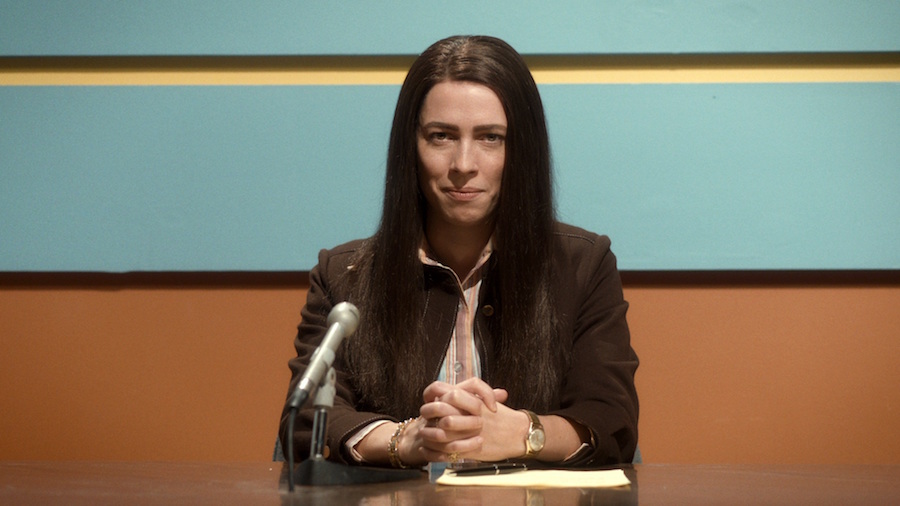‘Christine’ “Christine” opens with four familiar, to some perhaps dreaded words: “Based on a true story.” If you don’t know the story — the one about TV reporter Christine Chubbuck — what follows may play out very differently. It would seem like a sad and insightful study of loneliness and professional and personal frustration. You might even forget about those four introductory words entirely. The ending might come as a shock, even though it’s the reason the movie exists at all: On the morning of July 15, 1974, Chubbuck sat a news desk and shot herself behind the ears, live on the air. She was pronounced dead 14 hours later. One oughtn’t to take the act of making a movie about someone known primarily, even solely, for such a final act lightly. The anxiety over such an undertaking are such that this year’s Sundance was hit with not only “Christine” but also “Kate Plays Christine,” Robert Greene’s agitated meta-doc, in which Kate Lyn Sheil played “herself” making a fake movie about Chubbuck. If one saw Greene’s film through to its logical conclusion, one would agree that the any film about this woman, about whom not much beyond her suicide and vague details of an unhappy life are known, would be a violation. (We reviewed it here and talked to Greene here.) And yet there sits Antonio Campos’ “Christine,” ready to be torn apart. But “Christine” isn’t eviscerated so easily. It’s in many ways a typical biopic. For one thing, it’s a showcase for a terrific actor, Rebecca Hall, who plays Chubbuck as a bundle of nerves buried under a claustrophobic mane of straight black hair. Stuck in sleepy Sarasota, Florida, she wants to fill the airs with smart and productive stories about community awareness. Instead her boss (Tracy Letts) is a feminist-hating drill sergeant whose own bosses breathe down his neck about ratings. He talks of ramping up “blood and guts” reporting — the very words Chubbuck herself spoke, with epic disdain, on the air before shooting herself. Chubbuck tries to play ball but can’t. She watches as colleagues score better gigs elsewhere. A 29-year-old virgin, she’s puritanical about her roommate/mother (J. Smith-Cameron) bringing home new boyfriends, and can’t spend more than a few minutes at parties before fleeing back to do work no one will enjoy. RELATED: Interview: Rebecca Hall on finding compassion for a real person in “Christine” Campos’ previous credits, including “Afterschool” and “Simon Killer,” suggest “Christine” will be clinical and fractured. He only directed it, though, from a script by Craig Shilowich that sat around, unproduced, for years. This is a more conventional film, filled with on-the-nose dialogue and a final act decked out in dramatic music. It’s also deeply empathetic, but that’s not what makes “Christine” quietly fascinating, deceptively simple. In fact, it’s the relative conventionality that makes it effective. “Kate Plays Christine” works as both a deconstruction of narrativizing real people’s lives and as a stealth biopic, which covered her life as ethically as it could. But it didn’t (because it didn’t want to) convey what it felt like to live in 1974, and to be someone in Chubbuck’s skin. “Christine” knows what it’s like to live to a soundtrack of bone-chilling ’70s AM staples (John Denver, Boyce and Hart), what it’s like to be depressed and on edge in the bright sun and loud colors of Florida four decades ago, what it’s like to work on film Steenbeck editing slabs and to gently place a stylus into the grooves of a spinning LP. Where Sheil’s Chubbuck was zombified, like a walking, talking blank slate, Hall’s is alive and grouchy and even wryly funny, always “on,” always trying to simulate what she thinks is normal, everyday behavior. The linear structure allows us to see her mental descent, but look closely and you’ll see it carefully avoids a simple explanation for her suicide. She’s living with her pain, but there’s no one deciding incident. There are many things snowballing in her life: career disappointments, romantic disappointments, general people-phobia, the first real signs of journalism’s death. But the film knows that even those smashed together isn’t enough to explain away what she did. You don’t need to beat “Christine” with “Kate Plays Christine.” Instead putting the two together winds up more powerful than both of them combined. They add up to a story that reclaims Chubbuck from a “Faces of Death” curio, known only for blowing her brains out two years before Howard Beale threatened to do the same in “Network.” If Greene’s film didn’t exist, “Christine” might be just another well-intentioned if beautifully-acted biopic. Instead, you can say it makes the case that biopics can be useful: It allows us to live in something like her skin and understand something deeper about her than we could glean from mere cold facts. It’s a deeply sad movie that allows us to connect with someone we’d never have known otherwise.
Director: Antonio Campos
Stars: Rebecca Hall, Michael C. Hall
Rating: R
3 (out of 5) Globes
‘Christine’ shows that simplified biopics can be useful, too

The Orchard
Follow Matt Prigge on Twitter @mattprigge


















